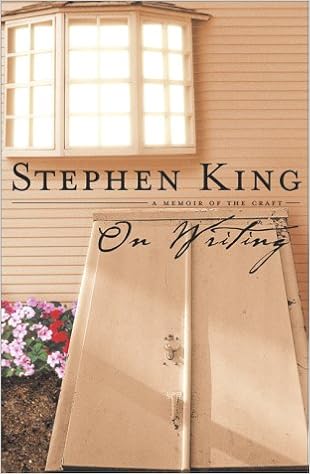|
Stephen King, On Writing: A Memoir of the Craft (Scribner, 2000) Let me get this right out of the way. I am not a Stephen King fan. I do not normally read his books, nor do I watch the movies derived from them. His stuff just isn't my style. But when I heard that he was coming out with On Writing, I became quite curious, so I picked up a copy.
The book is divided into several sections. Rather than a single forward, King has three (hey, if one is good, three is better, right?), each progressively shorter. In the first section, "C. V.," King gives us what he calls "snapshots" of his early life, the moments that helped mold him into a writer. He takes us through his earliest memories through the writing of his early novels, paying particular attention to Carrie. He matter-of-factly talks about his alcohol and drug addiction and its effect on his writing, before moving on to "Toolbox," the next section of the book. "Toolbox" is a very short section devoted to a writer's tools, vocabulary and grammar. King's advice on how to use these tools is very direct and starts with "Buy a copy of Strunk & White's The Elements of Style." The next section, "On Writing," talks about what happens when you have all your tools in order. King recommends reading and writing above all things, especially reading, then goes into detail about the use of different techniques. In "On Living: A Postscript," King talks about his near-fatal car accident, when a reckless driver hit him as he walked along a country road. The details of his injuries and his memories of events surrounding the accident are as frightening as any of his fiction. Following that are two epilogues. In the first, King sets out the opening passage to a story and then revises it, complete with editor's markings. The second is a recommended reading list, ranging the gamut of literature, from Thomas Harris's Hannibal to J. K. Rowling's Harry Potter series. King's advice is straightforward and down-to-earth. He tells what works for him and why, and he gives his opinions on the uses of language. The language he uses to express these opinions is very earthy, even vulgar -- and that latter, fairly often. Rather than being off-putting, this makes the book almost like a conversation between the reader and King, rather than a gods-given directive from on high stating that THIS IS HOW IT SHOULD BE DONE. And it's an interesting conversation, too. You may agree or disagree with King's advice, you may be shocked at his language, but when you put On Writing down, you will have been vastly entertained. 
|
 Rambles.NET book review by Laurie Thayer 10 March 2001 Agree? Disagree? Send us your opinions!  



 |

